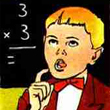Monday, 22 April 2013
“I have it at the tip of my tongue!”
 Having a word “at the tip of your tongue” is a familiar but frustrating sensation. There it is, not very far, you know it, you can feel it, but you can’t find it! To make matters worse, very often another word keeps popping into your mind—you know it’s not the right one, but it keeps getting in the way so that you can’t find the one you’re looking for.
Having a word “at the tip of your tongue” is a familiar but frustrating sensation. There it is, not very far, you know it, you can feel it, but you can’t find it! To make matters worse, very often another word keeps popping into your mind—you know it’s not the right one, but it keeps getting in the way so that you can’t find the one you’re looking for. 
Scientists say that all of us experience this phenomenon at least once per week, and more often as we get older. They also know that more than 9 times out 10, we end up finding the right word, although often in unexpected ways, and that this is an example of meta…you know, when you make judgments about your own thought processes…mmm, metempsychosis? No. Metencephalon? No, that’s not it either. Oh yeah—metacognition!
And that’s what’s so fascinating about this phenomenon: you can’t remember a piece of information, but you are firmly convinced that you know it. For a long time, scientists didn’t bother studying metacognition, because they regarded it as too abstract a concept. But now they have experimental protocols for examining it, in particular by means of brain imaging, which, for example, lets them explore what is going on in people’s brains when they have a word at the tip of their tongues.
And the more that scientists study human memory from this standpoint, the more they realize the limitations of the old model according to which our mind has direct access to its unconscious content, which is well classified like a library and from which we can retrieve information at will. On the contrary, our memories seem to be stored in detached pieces—for example, the image of a friend’s face in one location, the sound of her name in another, and the spelling of her name in yet a third.
Thus, remembering one aspect of something that you are trying to recall does not always let you remember the whole thing. But as you search for a particular word, for example, and you gradually remember various aspects of it (and thus probably activate more and more areas of the vast neuronal assembly corresponding to it), you first become convinced that you know it, and then end up finding it, along with the comforting illusion that this memory was all in one piece to begin with.
*
Don’t forget our donations campaign! See the funding update in the column to the right, just below our “fundraising thermometer”.
![]() What’s that name?
What’s that name?
![]() Je l’ai sur le bout de la langue !
Je l’ai sur le bout de la langue !
From Thought to Language | Comments Closed








